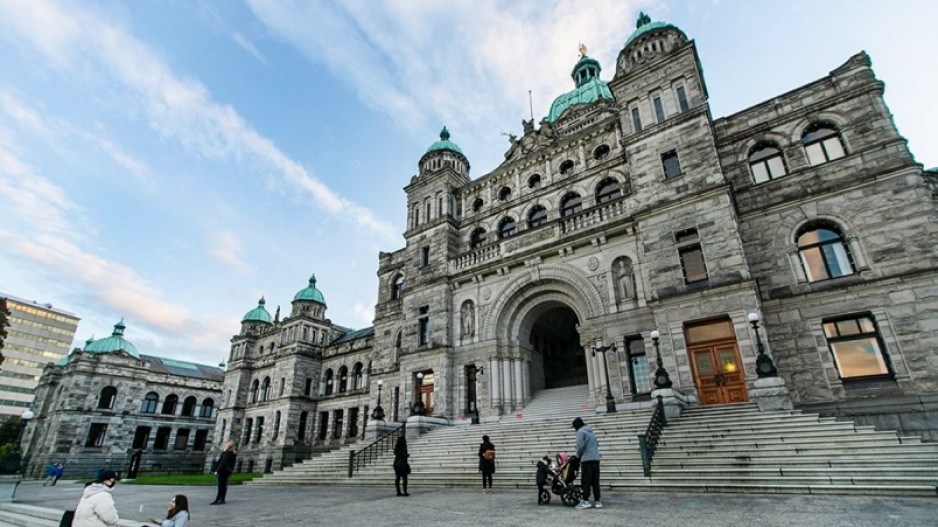Local councils and First Nations have added their voices to the chorus of concerns over the provincial NDP government’s rush to approve the Infrastructure Projects Act, saying the top-down approach and lack of environmental oversight on major developments undermines locally elected officials and sets dangerous precedents.
Bill 15 was introduced May 1 and allows the provincial cabinet sweeping powers to pass major public projects like schools, hospitals, student housing and any other projects deemed “provincially significant,” including critical mineral mines, through an expedited environmental assessment process and easing of the permitting procedure.
The bill was formed amid a rocky relationship with the United States and the economic uncertainty from a trade war.
Municipalities have sharply criticized the David Eby government for plans to push the act through the legislature by May 28. They say the new law would bypass local planning, override bylaws for quick approvals and eliminate meaningful community input on developments.
“This government has adopted a disturbing trend — declare a crisis, bypass consultation and impose a top-down solution,” said View Royal Mayor Sid Tobias. “The erosion of democratic norms does not come all at once — it comes through measures like these.”
He called Bill 15 dangerous to the integrity of public governance. “What we are seeing is the centralization of power, suppression of dissent, and erosion of process that mirrors some of the most troubling trends we’ve seen elsewhere, including under the Trump administration in the United States,” said Tobias.
The mayor has some advice for MLAs.
“This is your test,” said Tobias. “Represent your constituents, not your caucus. Refuse to treat a vote on local governance as a test of party loyalty. Imagine a democracy where no vote is a vote of confidence, but every vote is a vote of conscience. That is the standard the people of this province deserve.”
Esquimalt Mayor Barbara Desjardins called Bill 15 an “overreach” by the province without any consultation with local governments.
“This removes community input, voice and local decision making,” she said. “Communities are made up of more than just infrastructure, and local governments know this best.”
First Nations have also condemned the bill, saying with no meaningful consultation it violates the province’s obligations under the Declaration of the Rights of Indigenous Peoples Act.
Tsartlip Chief Don Tom called Bill 15 “a power grab,” adding Eby’s government is sidelining a duty to consult with First Nations.
He said the Tsartlip is reminding the premier that he has only a one-seat majority and called on the three First Nations members of the caucus — Tamara Davidson, Joan Phillip and Deb Toporowski — to vote against Bill 15.
“We have collectively experienced the deep damage done by colonial decision-making in our communities, and each of you holds a seat in a government that is preparing to repeat the same harm — this time through legislation cloaked in red tape reduction,” Tom said in a statement.
“This is the time to set aside your partisan interests and stand with your relatives.”
The Nuu-Chah-Nulth Tribal Council, representing 14 First Nations on the Island’s west coast, also condemned Bill 15.
“Things done in a rush will backfire on provincial government-First Nation relationships, reconciliation and all the work done to date on UNDRIP,” said council president Judith Sayers. “They cannot pick and choose when to engage meaningfully with First Nations and when they won’t.”
The First Nations Leadership Council, the Union of British Columbia Indian Chiefs and the B.C. Assembly of First Nations have all condemned the bill because of the lack of consultations.
Both Opposition parties, the Conservatives and the Greens, have voiced opposition to the legislation, leaving the government with the possibility that it will have to call on Speaker Raj Chouhan to cast the tie-breaking vote to pass it.
If a single NDP MLA isn’t present or votes against the legislation, it could fail.
Nevertheless, Eby has signalled his intention to push the legislation forward, while his House leader, Mike Farnworth, has made the bill a confidence motion, meaning the government could fall if the legislation is rejected.
Farnworth has also introduced a requirement that a final vote must be held no later than 8 p.m. on May 28. It gives the House no more than four days to get through second reading, committee stage and third reading.
The bill passed second reading on Thursday by two votes, as 46 New Democrats voted in favour, while 41 Conservatives joined the two B.C. Greens and Independent Jordan Kealy to vote against it.
Independents Brodie Dallas and Tara Armstrong were absent from the vote.
Meanwhile, Infrastructure Minister Bowinn Ma told the House her government “made an error” in not adequately consulting First Nations.
Her admission came during debate Thursday over concerns relayed by the First Nations Leadership Council, the Union of British Columbia Indian Chiefs and the B.C. Assembly of First Nations.
Ma has rejected complaints, saying the proposed bill neither changes environmental standards nor the constitutional rights of First Nations to be consulted on projects.
But she acknowledged that the government has misread the interests of Indigenous leaders and promises that her government will consult First Nations widely on the regulations.
Ma and Premier David Eby, who has already met with First Nations leaders about Bill 15, were scheduled to meet with them again later Thursday.
Sooke Mayor Maja Tait said the minister is holding a briefing on the bill with munipcal leaders today.
Opposition Conservative Leader John Rustad renewed his call on Thursday for the government to withdraw the bill to allow for proper consultations.
— with files from the Canadian Press and Vancouver Sun



